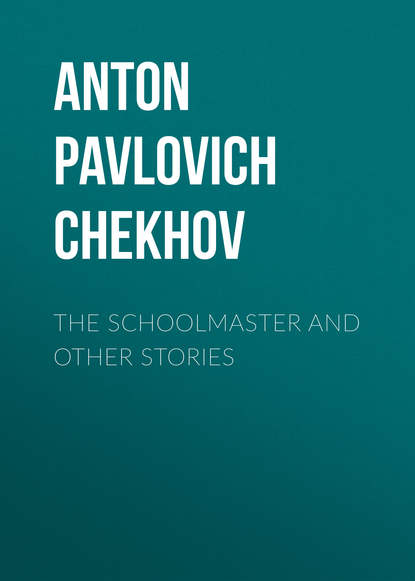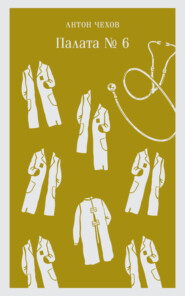По всем вопросам обращайтесь на: info@litportal.ru
(©) 2003-2024.
✖
The Schoolmaster and Other Stories
Настройки чтения
Размер шрифта
Высота строк
Поля
For a fortnight he was silent and gloomy and kept walking up and down and thinking. In the end he overcame his sceptical vanity, and going into his wife's room he said in a hollow voice:
"Zina, call up Fedyukov!"
The spiritualistic lady was delighted; she sent for a sheet of cardboard and a saucer, made her husband sit down beside her, and began upon the magic rites.
Fedyukov did not keep them waiting long..
"What do you want?" asked Navagin.
"Repent," answered the saucer.
"What were you on earth?"
"A sinner.."
"There, you see!" whispered his wife, "and you did not believe!"
Navagin conversed for a long time with Fedyukov, and then called up Napoleon, Hannibal, Askotchensky, his aunt Klavdya Zaharovna, and they all gave him brief but correct answers full of deep significance. He was busy with the saucer for four hours, and fell asleep soothed and happy that he had become acquainted with a mysterious world that was new to him. After that he studied spiritualism every day, and at the office, informed the clerks that there was a great deal in nature that was supernatural and marvellous to which our men of science ought to have turned their attention long ago.
Hypnotism, mediumism, bishopism, spiritualism, the fourth dimension, and other misty notions took complete possession of him, so that for whole days at a time, to the great delight of his wife, he read books on spiritualism or devoted himself to the saucer, table-turning, and discussions of supernatural phenomena. At his instigation all his clerks took up spiritualism, too, and with such ardour that the old managing clerk went out of his mind and one day sent a telegram: "Hell. Government House. I feel that I am turning into an evil spirit. What's to be done? Reply paid. Vassily Krinolinsky."
After reading several hundreds of treatises on spiritualism Navagin had a strong desire to write something himself. For five months he sat composing, and in the end had written a huge monograph, entitled: My Opinion. When he had finished this essay he determined to send it to a spiritualist journal.
The day on which it was intended to despatch it to the journal was a very memorable one for him. Navagin remembers that on that never-to-be-forgotten day the secretary who had made a fair copy of his article and the sacristan of the parish who had been sent for on business were in his study. Navagin's face was beaming. He looked lovingly at his creation, felt between his fingers how thick it was, and with a happy smile said to the secretary:
"I propose, Filipp Sergeyitch, to send it registered. It will be safer.." And raising his eyes to the sacristan, he said: "I have sent for you on business, my good man. I am putting my youngest son to the high school and I must have a certificate of baptism; only could you let me have it quickly?"
"Very good, your Excellency!" said the sacristan, bowing. "Very good, I understand.."
"Can you let me have it by to-morrow?"
"Very well, your Excellency, set your mind at rest! To-morrow it shall be ready! Will you send someone to the church to-morrow before evening service? I shall be there. Bid him ask for Fedyukov. I am always there.."
"What!" cried the general, turning pale.
"Fedyukov."
"You… you are Fedyukov?" asked Navagin, looking at him with wide-open eyes.
"Just so, Fedyukov."
"You… you signed your name in my hall?"
"Yes." the sacristan admitted, and was overcome with confusion. "When we come with the Cross, your Excellency, to grand gentlemen's houses I always sign my name… I like doing it… Excuse me, but when I see the list of names in the hall I feel an impulse to sign mine.."
In dumb stupefaction, understanding nothing, hearing nothing, Navagin paced about his study. He touched the curtain over the door, three times waved his hands like a jeune premier in a ballet when he sees her, gave a whistle and a meaningless smile, and pointed with his finger into space.
"So I will send off the article at once, your Excellency," said the secretary.
These words roused Navagin from his stupour. He looked blankly at the secretary and the sacristan, remembered, and stamping, his foot irritably, screamed in a high, breaking tenor:
"Leave me in peace! Lea-eave me in peace, I tell you! What you want of me I don't understand."
The secretary and the sacristan went out of the study and reached the street while he was still stamping and shouting:
"Leave me in peace! What you want of me I don't understand. Lea-eave me in peace!"
STRONG IMPRESSIONS
IT happened not so long ago in the Moscow circuit court. The jurymen, left in the court for the night, before lying down to sleep fell into conversation about strong impressions. They were led to this discussion by recalling a witness who, by his own account, had begun to stammer and had gone grey owing to a terrible moment. The jurymen decided that before going to sleep, each one of them should ransack among his memories and tell something that had happened to him. Man's life is brief, but yet there is no man who cannot boast that there have been terrible moments in his past.
One juryman told the story of how he was nearly drowned; another described how, in a place where there were neither doctors nor chemists, he had one night poisoned his own son through giving him zinc vitriol by mistake for soda. The child did not die, but the father nearly went out of his mind. A third, a man not old but in bad health, told how he had twice attempted to commit suicide: the first time by shooting himself and the second time by throwing himself before a train.
The fourth, a foppishly dressed, fat little man, told us the following story:
"I was not more than twenty-two or twenty-three when I fell head over ears in love with my present wife and made her an offer. Now I could with pleasure thrash myself for my early marriage, but at the time, I don't know what would have become of me if Natasha had refused me. My love was absolutely the real thing, just as it is described in novels – frantic, passionate, and so on. My happiness overwhelmed me and I did not know how to get away from it, and I bored my father and my friends and the servants, continually talking about the fervour of my passion. Happy people are the most sickening bores. I was a fearful bore; I feel ashamed of it even now..
"Among my friends there was in those days a young man who was beginning his career as a lawyer. Now he is a lawyer known all over Russia; in those days he was only just beginning to gain recognition and was not rich and famous enough to be entitled to cut an old friend when he met him. I used to go and see him once or twice a week. We used to loll on sofas and begin discussing philosophy.
"One day I was lying on his sofa, arguing that there was no more ungrateful profession than that of a lawyer. I tried to prove that as soon as the examination of witnesses is over the court can easily dispense with both the counsels for the prosecution and for the defence, because they are neither of them necessary and are only in the way. If a grown-up juryman, morally and mentally sane, is convinced that the ceiling is white, or that Ivanov is guilty, to struggle with that conviction and to vanquish it is beyond the power of any Demosthenes. Who can convince me that I have a red moustache when I know that it is black? As I listen to an orator I may perhaps grow sentimental and weep, but my fundamental conviction, based for the most part on unmistakable evidence and fact, is not changed in the least. My lawyer maintained that I was young and foolish and that I was talking childish nonsense. In his opinion, for one thing, an obvious fact becomes still more obvious through light being thrown upon it by conscientious, well-informed people; for another, talent is an elemental force, a hurricane capable of turning even stones to dust, let alone such trifles as the convictions of artisans and merchants of the second guild. It is as hard for human weakness to struggle against talent as to look at the sun without winking, or to stop the wind. One simple mortal by the power of the word turns thousands of convinced savages to Christianity; Odysseus was a man of the firmest convictions, but he succumbed to the Syrens, and so on. All history consists of similar examples, and in life they are met with at every turn; and so it is bound to be, or the intelligent and talented man would have no superiority over the stupid and incompetent.
"I stuck to my point, and went on maintaining that convictions are stronger than any talent, though, frankly speaking, I could not have defined exactly what I meant by conviction or what I meant by talent. Most likely I simply talked for the sake of talking.
"'Take you, for example,' said the lawyer. 'You are convinced at this moment that your fiancée is an angel and that there is not a man in the whole town happier than you. But I tell you: ten or twenty minutes would be enough for me to make you sit down to this table and write to your fiancée, breaking off your engagement.
"I laughed.
"'Don't laugh, I am speaking seriously,' said my friend. 'If I choose, in twenty minutes you will be happy at the thought that you need not get married. Goodness knows what talent I have, but you are not one of the strong sort.'
"'Well, try it on!' said I.
"'No, what for? I am only telling you this. You are a good boy and it would be cruel to subject you to such an experiment. And besides I am not in good form to-day.'
"We sat down to supper. The wine and the thought of Natasha, my beloved, flooded my whole being with youth and happiness. My happiness was so boundless that the lawyer sitting opposite to me with his green eyes seemed to me an unhappy man, so small, so grey..
"'Do try!' I persisted. 'Come, I entreat you!
"The lawyer shook his head and frowned. Evidently I was beginning to bore him.
"'I know,' he said, 'after my experiment you will say, thank you, and will call me your saviour; but you see I must think of your fiancée too. She loves you; your jilting her would make her suffer. And what a charming creature she is! I envy you.'
"The lawyer sighed, sipped his wine, and began talking of how charming my Natasha was. He had an extraordinary gift of description. He could knock you off a regular string of words about a woman's eyelashes or her little finger. I listened to him with relish.
"'I have seen a great many women in my day,' he said, 'but I give you my word of honour, I speak as a friend, your Natasha Andreyevna is a pearl, a rare girl. Of course she has her defects – many of them, in fact, if you like – but still she is fascinating.'
"And the lawyer began talking of my fiancée's defects. Now I understand very well that he was talking of women in general, of their weak points in general, but at the time it seemed to me that he was talking only of Natasha. He went into ecstasies over her turn-up nose, her shrieks, her shrill laugh, her airs and graces, precisely all the things I so disliked in her. All that was, to his thinking, infinitely sweet, graceful, and feminine.
"Without my noticing it, he quickly passed from his enthusiastic tone to one of fatherly admonition, and then to a light and derisive one… There was no presiding judge and no one to check the diffusiveness of the lawyer. I had not time to open my mouth, besides, what could I say? What my friend said was not new, it was what everyone has known for ages, and the whole venom lay not in what he said, but in the damnable form he put it in. It really was beyond anything!

















